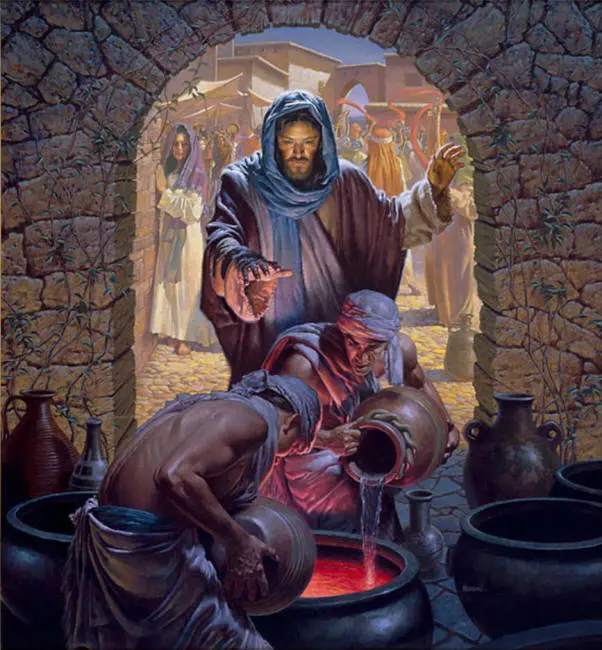WHICH JESUS DO YOU KNOW — THE RELIGIOUS JESUS OR THE REVEALED JESUS
Introduction
Praise be to our Lord and Savior, Jesus Christ!
Many people claim to know Jesus—but which Jesus do they know? Is it the religious Jesus they were introduced to through tradition, family, or church culture? Or is it the revealed Jesus, the one personally made known to them by the Holy Spirit?
This distinction is critical, not only for our spiritual maturity but also for our ability to walk in the authority and power Jesus promised. Let’s explore this through the life of Peter, whose journey shows the difference between knowing about Jesus and truly knowing Him through revelation.
1. THE RELIGIOUS JESUS — Secondhand Faith
Peter’s first encounter with Jesus came through the testimony of his brother, Andrew:
“Andrew, Simon Peter’s brother, was one of the two who heard what John had said and who had followed Jesus. The first thing Andrew did was to find his brother Simon and tell him, ‘We have found the Messiah’ (that is, the Christ). And he brought him to Jesus.”
— John 1:40–42
Here, Peter believes in Jesus because someone else told him. This is an example of religious knowledge—faith that is rooted in tradition, human testimony, or religious teaching, not in personal spiritual experience.
2. THE REVEALED JESUS — Spirit-Born Faith
Later in Peter’s journey, something shifts. In Matthew 16, Jesus tests His disciples’ understanding of His identity:
“But what about you?” he asked. “Who do you say I am?”
Simon Peter answered, “You are the Messiah, the Son of the living God.”
Jesus replied, “Blessed are you, Simon son of Jonah, for this was not revealed to you by flesh and blood, but by my Father in heaven.”
— Matthew 16:15–17
This moment marks Peter’s spiritual awakening. The truth about Jesus isn’t just something he’s been told—it’s now something personally revealed to him by God. This is the work of the Holy Spirit (see 1 Corinthians 2:10–12).
3. THE FRUIT OF REVELATION — Authority and Purpose
Once Peter receives this divine revelation, Jesus gives him spiritual authority:
“I tell you that you are Peter, and on this rock I will build my church, and the gates of Hades will not overcome it.
I will give you the keys of the kingdom of heaven; whatever you bind on earth will be bound in heaven, and whatever you loose on earth will be loosed in heaven.”
— Matthew 16:18–19
Peter receives authority (“the keys”) only after the revelation of Jesus’ identity. This shows us that spiritual authority flows out of revelation, not religion.
4. WHY MANY BELIEVERS FEEL POWERLESS TODAY
Today, many Christians struggle with spiritual dryness or lack of impact. Often, it’s because they’ve only known the religious Jesus—not the revealed Jesus. They have doctrines, sermons, and traditions, but not the living encounter with Christ that the Spirit offers.
As Paul writes in 2 Timothy 3:5
“…having a form of godliness but denying its power. Have nothing to do with such people.”
5. HOW TO RECEIVE THE REVEALED JESUS
So how do we move from religion to revelation? It begins with surrender.
“Whoever wants to be my disciple must deny themselves and take up their cross daily and follow me.”
— Luke 9:23
Steps Toward Revelation:
- Lay aside religious pride and traditions that replace intimacy with Christ.
- Seek God in humility, acknowledging that head knowledge isn’t enough.
- Invite the Holy Spirit to reveal Jesus personally to your heart.
- Spend time in Scripture and prayer, not for routine, but for relationship.
- Be open to God correcting false assumptions and deepening your understanding.
Jeremiah 29:13
“You will seek me and find me when you seek me with all your heart.”
So again, let’s ask ourselves honestly:
Which Jesus do I know? The one I’ve heard about—or the One who has been revealed to me by the Spirit?
May the Lord open the eyes of your heart to see Jesus clearly and personally.
“I keep asking that the God of our Lord Jesus Christ, the glorious Father, may give you the Spirit of wisdom and revelation, so that you may know him better.”
— Ephesians 1:17
Understanding Isaiah 24:16–18 – “My Leanness!” in Light of Christ
Question: What is the meaning of Isaiah 24:16–18, especially the part where the prophet says, “My leanness! My leanness!”?
Answer:
Isaiah 24:16–18:
16 From the ends of the earth we hear singing: “Glory to the Righteous One.” But I said, “I waste away, I waste away! Woe to me! The treacherous betray! With treachery the treacherous betray!”
17 Terror and pit and snare await you, people of the earth.
18 Whoever flees at the sound of terror will fall into a pit; whoever climbs out of the pit will be caught in a snare. The floodgates of the heavens are opened, the foundations of the earth shake.
1. The Righteous One and the Joy of His Revelation (v.16a)
Isaiah hears voices from the ends of the earth praising “the Righteous One.” This is a prophetic vision of global worship directed toward the Messiah — Jesus Christ. The title “Righteous One” aligns with messianic titles found elsewhere in Scripture (see Acts 3:14, Isaiah 53:11). His arrival is portrayed as glorious and praiseworthy, echoing how angels and people celebrated Christ’s birth and entrance into Jerusalem (cf. Luke 2:10–14; John 12:12–13).
2. The Prophet’s Grief Amid Rebellion (v.16b)
Immediately after hearing these praises, Isaiah exclaims in sorrow:
“I waste away! Woe to me! The treacherous betray!”
The phrase “I waste away” (or “My leanness!” Isaiah is heartbroken not because of the glory of the Messiah, but because of how people will respond to Him — with betrayal, not worship. This betrayal culminated historically in the rejection and crucifixion of Christ by His own people (cf. John 1:11, Luke 23:18–23).
3. God’s Judgment on a Sinful World (vv.17–18)
Verses 17–18 then shift to a warning of judgment:
- Those who run from terror will fall into a pit.
- Those who escape the pit will be caught in a snare.
- The heavens are opened, and the earth’s foundations shake.
This is apocalyptic language, describing the “Day of the Lord” — a future time when God will judge the earth (cf. Zephaniah 1:14–18, Revelation 6:12–17). The shaking of the earth and the opening of the heavens speak to divine wrath and cosmic upheaval, emphasizing that no one can escape God’s justice without His mercy.
4. The Urgency of Accepting Christ
The message is clear: the Righteous One has come — and will come again. To reject Him is to face eternal judgment. As Paul writes, “All have sinned and fall short of the glory of God” (Romans 3:23,), and “the wages of sin is death” (Romans 6:23a). But “the gift of God is eternal life in Christ Jesus our Lord” (Romans 6:23b).
Salvation is not based on our good works, but on faith in Jesus Christ (cf. Ephesians 2:8–9). If we reject Him, we are left to face judgment alone — and we will not stand. But if we receive Him, our sins are forgiven, and our names are written in the Book of Life (cf. Revelation 20:15).
5. A Final Plea
If you haven’t yet accepted Jesus Christ as your Lord and Savior, now is the time. The end of the age is near. If you were to die today, are you confident you would be with God?
“Everyone who calls on the name of the Lord will be saved.” – Romans 10:13
May the Lord bless you.
Shalom.
THE POWER OF “REFUSAL” IN SPIRITUAL WARFARE
Spiritual warfare is a reality for every believer, and the foundation for victory in this battle is learning to “refuse” the enemy’s influence. This refusal begins in the heart where faith and conviction reside and is then spoken out through the mouth, giving life to your faith.
The heart and the mouth work together to shape your spiritual reality. When you acknowledge your weaknesses, you give the enemy legal ground to operate in your life. Conversely, when you confess your strength in Christ, you activate God’s power over your circumstances.
The Bible clearly teaches that the power of life and death lies in the tongue:
Proverbs 18:21 (NKJV)
“Death and life are in the power of the tongue,
And those who love it will eat its fruit.”
This means our words have real spiritual impact. This principle also underlies salvation: first, you must believe with your heart, and second, confess with your mouth.
Romans 10:9-10 (NKJV)
“That if you confess with your mouth the Lord Jesus and believe in your heart that God has raised Him from the dead, you will be saved.
For with the heart one believes unto righteousness, and with the mouth confession is made unto salvation.”
Thus, the battle starts internally your heart must align with God’s truth and is then reinforced externally through spoken faith. The enemy targets this dynamic, so in prayer and daily life, you must consistently refuse the devil’s lies and attacks, both in your heart and out loud.
What does it look like to refuse in spiritual warfare?Refuse sinDeclare your freedom from its grip, and it will lose power over you (Romans 6:14).Refuse fear and doubt These are tactics of the devil (1 John 4:18), so reject them by faith.Refuse weakness and anxiety Jesus offers strength and peace; refuse the enemy’s lies that you are powerless (Philippians 4:6-7).Refuse sickness and disease Jesus bore our sicknesses (Isaiah 53:5), so refuse the enemy’s attacks on your health.Refuse problems and troubles Declare God’s protection and provision over your life (Psalm 91).Refuse the devil’s plans and curses Break every assignment of the enemy spoken over you (Galatians 3:13).Refuse all evil names or labels Reject identities tied to your past or the enemy’s lies, because names carry spiritual significance (1 Samuel 25:25).
If you have a past life that involved sin or harmful identities, now that you are saved, renounce those names and the spirits attached to them. For example, if you once lived in sin or were labeled a thief, a thug, or any other negative term, refuse those titles in Jesus’ name.
The Bible gives us a powerful example in Moses, who “refused” to be known by an identity that did not reflect God’s purpose for him.
Hebrews 11:24-26 (NKJV)
“By faith Moses, when he became of age, refused to be called the son of Pharaoh’s daughter,
choosing rather to suffer affliction with the people of God than to enjoy the passing pleasures of sin,
esteeming the reproach of Christ greater riches than the treasures in Egypt; for he looked to the reward.”
Moses understood that continuing to identify with Pharaoh’s household meant embracing pride, idolatry, and evil. He chose instead to identify with God’s people, a decision that shaped his destiny and faith walk.
Today, many believers still cling to old, ungodly names or identities whether nicknames or cultural labels that don’t reflect who God has made them. It is essential to refuse these names with your mouth and demonstrate the change in your life. Refusing with your mouth but not changing your lifestyle or attitude renders the refusal ineffective.
Final encouragement
The victory in spiritual warfare is yours through faith-filled refusal starting in your heart and declared by your mouth. As you consistently refuse the devil’s lies and claims on your life, you position yourself to walk in the fullness of God’s promises.
May the Lord bless you.
What Is the Spirit of Rejection?
Question: Is there a spirit of rejection in the Bible? If so, how can someone be delivered from it?
Answer: The term “rejection” essentially refers to a state of “lacking favor.”
A person can lose favor in two main ways:
- With God
- With people
1. Losing Favor with God
The primary reason a person loses favor with God is sin. Theologically, sin is understood as rebellion against God’s will, leading to separation from Him. When sin takes root in a person’s life, it causes a breach in their relationship with God, which results in a loss of His favor. This often manifests as unanswered prayers or a lack of progress in one’s endeavors.
Isaiah 59:1-2 says:
“Surely the arm of the Lord is not too short to save, nor His ear too dull to hear. But your iniquities have separated you from your God; your sins have hidden His face from you, so that He will not hear.”
This passage highlights the theological truth that sin creates distance between God and the believer, preventing the individual from receiving God’s favor or help. Theologically, this is seen as the result of God’s holiness—He cannot dwell with sin (Habakkuk 1:13).
An example of someone who lost favor with God is King Saul, who was rejected by God because of his disobedience (1 Samuel 16:1). Another example is Cain, who after murdering his brother, was marked with rejection and punishment by God (Genesis 4:10-12).
Genesis 4:10-12:
“The Lord said, ‘What have you done? Listen! Your brother’s blood cries out to me from the ground. Now you are under a curse and driven from the ground… When you work the ground, it will no longer yield its crops for you. You will be a restless wanderer on the earth.’”
Here, we see that Cain’s sin led not only to rejection from God but also to his social and spiritual alienation. Theologically, this speaks to the principle that unrepentant sin results in spiritual and relational disconnection from both God and others.
When someone loses favor with God, they may also lose favor with people, especially the right people—those who walk in righteousness. However, they might still find acceptance from people who are living in sin, but this is a dangerous and temporary situation. This is shown in the case of Cain, who feared being killed by others due to his rejection from God, but ironically, found some measure of acceptance from his own.
The Root Cause of Rejection: Sin
Theologically, the root of rejection—both divine and human—is sin. Since all sin is stirred up by the spirit of the enemy (the devil) and his demons, it is accurate to say that rejection can be a spiritual force. The Bible teaches that sin entered the world through Satan’s deception of Adam and Eve (Genesis 3:1-7) and continues to be perpetuated by demonic influences (Ephesians 2:2-3).
Ephesians 2:2-3:
“As for you, you were dead in your transgressions and sins, in which you used to live when you followed the ways of this world and of the ruler of the kingdom of the air, the spirit who is now at work in those who are disobedient.”
Therefore, the spirit of rejection can be understood as an influence from evil spirits, which work to keep a person in sin and separation from God.
If you find that everywhere you go, you’re rejected by people and can’t seem to figure out why, it’s crucial to consider that a spirit of rejection may be at work. This spirit could be influencing your life through unresolved sin. The Bible teaches that sin is the work of the flesh and the enemy (Romans 8:5-8), and this spirit can lead to rejection, disappointment, and broken relationships.
The Solution: Salvation and Repentance
The only way to break free from the spirit of rejection is through genuine salvation. Theologically, salvation is the work of God’s grace through Jesus Christ, bringing the believer back into right relationship with God through faith and repentance (Ephesians 2:8-9).
Ephesians 2:8-9
“For it is by grace you have been saved, through faith—and this is not from yourselves, it is the gift of God—not by works, so that no one can boast.”
Salvation means turning away from sin and surrendering to God’s will. If someone desires salvation but refuses to give up their sinful behavior—whether it’s fornication, drunkenness, theft, gossip, unforgiveness, hatred, jealousy, or any other sin—they cannot experience complete salvation. Theologically, salvation requires repentance, which means a change of heart and mind (Acts 3:19).
Acts 3:19:
“Repent, then, and turn to God, so that your sins may be wiped out, that times of refreshing may come from the Lord.”
However, someone who truly repents—meaning they are committed to turning away from sin—will receive complete salvation. This is not a superficial confession but a genuine transformation of the heart, empowered by the Holy Spirit (Romans 8:13).
The result of genuine salvation is not only the removal of the spirit of rejection but also the removal of all other evil spirits that may be influencing one’s life. Theologically, this is the work of deliverance, where the believer is freed from the power of sin and evil influences, and restored to full fellowship with God.
Romans 8:13:
“For if you live according to the flesh, you will die; but if by the Spirit you put to death the misdeeds of the body, you will live.”
This process of sanctification leads to a renewed mind, a transformed life, and the restoration of favor with both God and people. Theologically, this is the process of becoming more like Christ and being empowered to live a life that honors God.
May God bless you.
Why Was Jesus Arrested at Night Instead of During the Day
ANSWER:
Jesus was frequently surrounded by large crowds who admired Him, many recognizing Him as a prophet and teacher. This made it difficult for the religious leaders to arrest Him during the day without causing an uproar. They feared the public reaction, knowing the people believed in Jesus’ righteousness and authority.
Matthew 21:45–46
[45] When the chief priests and the Pharisees heard His parables, they perceived that He was speaking about them.
[46] And although they were seeking to arrest Him, they feared the crowds, because they held Him to be a prophet.
Arresting Jesus at night allowed the religious leaders to avoid confrontation with the crowds. It was a calculated move driven by fear and hypocrisy. They approached Him with swords and clubs—as if He were a dangerous criminal—despite knowing that He was innocent.
This action revealed their guilty conscience. They chose darkness because their deeds were evil, echoing a consistent biblical theme: those who act unjustly prefer darkness to avoid being exposed by the light.
Mark 14:48–49
[48] And Jesus said to them, “Have you come out as against a robber, with swords and clubs to capture Me?
[49] Day after day I was with you in the temple teaching, and you did not seize Me. But let the Scriptures be fulfilled.”
This moment was not accidental—it fulfilled God’s divine plan for salvation. The arrest of Jesus, His suffering, and His crucifixion were foretold in Scripture (see Isaiah 53). Though the religious leaders believed they were silencing Him, they were actually fulfilling God’s redemptive purpose.
This contrast between light and darkness is central to Christian theology. Jesus is described as the Light of the world—the One who exposes sin, offers truth, and gives life. His arrest in the darkness highlights the spiritual blindness of those who rejected Him.
John 1:4–5
[4] In Him was life, and the life was the light of men.
[5] The light shines in the darkness, and the darkness has not overcome it.
Despite being betrayed and arrested under the cover of night, Jesus’ light could not be extinguished. Instead, His death and resurrection became the very means through which humanity would be offered eternal life.
Jesus was arrested at night not because of chance, but because of fear, hypocrisy, and the fulfillment of prophecy. In doing so, the darkness revealed itself—but it also revealed the unstoppable power of God’s light and grace.
Believe in Christ. Let His light shine in your heart and overcome every shadow.
Shalom.
WHERE IS THE BELIEVER’S BONDAGE?
You might ask, “Can a believer really be bound by the enemy?” The answer is yes a believer can experience bondage. But then you may wonder, “If a believer can be bound, what was the purpose of Jesus’ work on the cross? Didn’t He set us free completely?”
The redemption Christ accomplished on the cross (cf. Romans 8:1 NIV) means that no believer stands condemned spiritually:
“Therefore, there is now no condemnation for those who are in Christ Jesus.”
However, this freedom in Christ does not always immediately translate into freedom in every area of the believer’s daily experience. Spiritual growth and maturity involve learning to walk in that freedom and resist the enemy’s attempts to bring bondage (Ephesians 6:10-18).
Spiritually, no believer’s inner person (spirit) can be held captive:
2 Corinthians 5:17 (NIV):
“Therefore, if anyone is in Christ, the new creation has come: The old has gone, the new is here!”
This means believers are fundamentally free from spiritual slavery because their identity is now in Christ.
Jesus’ mission was to set the captives free:
Luke 4:18 (NIV):
“He has sent me to proclaim freedom for the prisoners and recovery of sight for the blind…”
Believers who have repented, been baptized, and received the Holy Spirit (Acts 2:38) share this freedom at their core.
Yet, Satan still can hinder or limit believers externally.
Paul said:
1 Thessalonians 2:18 (NIV):
“For we wanted to come to you certainly I, Paul, did, again and again but Satan blocked our way.”
This is an example of external hindrance, not spiritual imprisonment.
Peter’s imprisonment illustrates how the enemy attacks believers externally:
Acts 12:4-9 (NIV) describes how Peter was bound with chains, guarded, had prison clothes, and was without shoes all signs of imprisonment.
Three areas the enemy targets:Hands (Prayer life)
Hands symbolize our ability to pray, fast, and spiritually fight.
Ephesians
6:18 (NIV) exhorts believers to “pray in the Spirit on all occasions with all kinds of prayers and requests.”
When our hands (prayer life) are bound,spiritual power is limited.When the early church prayed earnestly for Peter, God freed him:
Acts 12:5-7 (NIV)
recounts that while Peter was chained, “the church was earnestly praying to God for him.” The chains fell off after the angel’s intervention.
Likewise, Paul and Silas prayed and sang in prison, leading to their release:
Acts 16:25-26 (NIV):
“About midnight Paul and Silas were praying and singing hymns to God… Suddenly there was such a violent earthquake… that the prison was shaken… and all the prisoners’ chains came loose.”
Garments (Righteous living)
Garments represent righteous deeds and holy living:
Revelation 19:8 (NIV): “Fine linen, bright and clean, was given her to wear.” The fine linen stands for the righteous acts of God’s holy people.”
Without holiness (Hebrews 12:14), it’s difficult to resist the enemy. Sin gives the devil a foothold (Ephesians 4:27). A believer living in disobedience weakens their testimony and spiritual authority.
Feet (Readiness to share the Gospel)
Feet symbolize our readiness to spread the gospel and stand firm in faith:
Ephesians 6:15 (NIV):
“And with your feet fitted with the readiness that comes from the gospel of peace.”
The enemy tries to distract believers from their mission with worldly pleasures (1 John 2:15-16) and busyness, which can cause them to lose focus and become fruitless.
Summary and Application:Hands: Keep your prayer life strong to break chains (spiritual bondage).Garments: Pursue holiness and righteous living to maintain spiritual authority.Feet: Be ready and willing to share the gospel despite distractions.
When believers live this way, they walk in the freedom Christ purchased, resisting and overcoming the enemy both inside and outside.
Encouragement:
Don’t let the enemy bind you. Build a lifestyle of daily prayer, holy living, and readiness to serve God. God has already won the ultimate victory for you (Colossians 2:15).
May God richly bless you.
What is the Way of the Cross, and Is It Biblical
The Way of the Cross (also known as the Stations of the Cross) is a devotional practice commonly observed in the Roman Catholic Church. It is intended to help believers reflect on the suffering and crucifixion of Jesus Christ by symbolically retracing His final steps—from His condemnation by Pontius Pilate to His burial.
In Jerusalem, the path traditionally taken by pilgrims stretches about 600 meters, beginning at the Fortress of Antonia (believed to be where Jesus was sentenced) and ending at the Church of the Holy Sepulchre—considered to be near the place of His burial. Every Good Friday, Catholics walk this path in remembrance of Christ’s passion. For those outside Jerusalem, the practice is often carried out within churches, where worshippers move from image to image representing 14 key moments (or stations) in Jesus’ journey to the cross, pausing at each to pray.
The 14 Stations According to Catholic Tradition:
- Jesus is condemned to death.
- Jesus receives the cross.
- Jesus falls the first time.
- Jesus meets His mother.
- Simon of Cyrene helps carry the cross.
- Veronica wipes the face of Jesus.
- Jesus falls the second time.
- Jesus meets the women of Jerusalem.
- Jesus falls the third time.
- Jesus is stripped of His garments.
- Jesus is nailed to the cross.
- Jesus dies on the cross.
- Jesus’ body is taken down from the cross.
- Jesus is laid in the tomb.
What Does the Bible Say?
While the Way of the Cross is a meaningful tradition for many, it is important to ask: Is it biblically accurate? Not all of these 14 events are supported by Scripture.
Events that are clearly biblical include:
- Jesus being condemned to death (Matthew 27:26).
- Receiving the cross and going to Golgotha (John 19:17).
- Simon of Cyrene helping to carry the cross (Luke 23:26).
- Jesus speaking to the women of Jerusalem (Luke 23:27–31).
- Jesus being nailed to the cross and crucified (Luke 23:33; John 19:18).
- Jesus dying on the cross (John 19:30).
- Jesus’ body being taken down and buried (Luke 23:50–56).
However, some stations do not appear in Scripture:
- Stations 3, 7, and 9 (Jesus falling three times) are not mentioned anywhere in the Gospels.
- Station 4, where Jesus meets His mother, is not recorded in the biblical accounts of His journey to the cross.
- Station 6, where Veronica wipes His face, is entirely absent from the Bible and appears to originate from later tradition.
The Bible warns us not to add to or take away from God’s Word:
“Do not add to His words, lest He rebuke you, and you be found a liar.” — Proverbs 30:6
“For I testify to everyone who hears the words of the prophecy of this book: If anyone adds to these things, God will add to him the plagues that are written in this book.” — Revelation 22:18
Should Christians Practice the Way of the Cross?
As sincere as the intention might be, the practice of praying through the Stations—especially when focused on images or locations—can drift into idolatry, something the Bible clearly forbids:
“You shall not make for yourself a carved image… you shall not bow down to them nor serve them.” — Exodus 20:4–5
Jesus Himself told the Samaritan woman:
“God is Spirit, and those who worship Him must worship in spirit and truth.” — John 4:24
While meditating on Christ’s suffering is biblical (Philippians 3:10), turning it into a ritual that is not grounded in Scripture or based on unverifiable events may lead people away from true worship. Our reflection on the cross should come from biblical truth, not man-made traditions.
Furthermore, Jesus never instructed His followers to commemorate His suffering through stations or pilgrimage. Instead, He commanded us to remember His death through the Lord’s Supper:
“Do this in remembrance of Me.” — Luke 22:19
The Way of the Cross, as practiced in Catholic tradition, contains a mixture of biblical and non-biblical elements. While reflecting on Jesus’ suffering is valuable, Christians should be careful not to base their faith practices on traditions not found in Scripture. Our focus should remain on the Word of God—complete, inspired, and sufficient.
Let our worship be guided by truth, not human invention.
Shalom.
What Was the First Miracle of the Lord Jesus, and What Does It Teach Us?
Question: What was the first miracle that Jesus performed?
Answer: The first recorded miracle of the Lord Jesus took place at a wedding in Cana of Galilee, where He turned water into wine (John 2:1–11,).
The Story (John 2:1–11)
Jesus, His mother Mary, and His disciples were guests at a wedding in Cana. During the celebration, the wine ran out — a serious cultural embarrassment at the time. Mary told Jesus about the situation, implying that He could help. Though He responded, “Woman, what does this have to do with me? My hour has not yet come” (John 2:4), Mary instructed the servants, “Do whatever he tells you” (John 2:5).
Jesus then told the servants to fill six stone jars used for Jewish purification rituals with water. After they did, He instructed them to draw some and take it to the master of the feast. When the master tasted it, the water had become wine — and not just any wine, but the finest served that day. The master was amazed that such good wine was brought out so late in the feast.
Verse 11 summarizes the event:
“This, the first of his signs, Jesus did at Cana in Galilee, and manifested his glory. And his disciples believed in him.”
— John 2:11,
The miracle at Cana is more than a wedding story — it’s the first revelation of Jesus’ divine nature and mission. It teaches us that Christ brings transformation, joy, and abundant life. It also reminds us that true faith grows as we witness His glory through both Scripture and personal experience.
May the Lord bless you and deepen your faith in Christ Jesus.
What is so special about wine that the Lord JESUS turned water into wine?
Answer:
There was nothing inherently special or magical about the wine itself.
The Lord JESUS turned water into wine simply because wine was what was needed at the moment. According to John 2:1–11, Mary, the mother of Jesus, informed Him that the wine had run out. If it had been food that was lacking, Jesus might have multiplied food, as He did in the miracles of the five loaves and two fish (Mark 6:38–44; Luke 9:13–17). But because wine was what was missing, He met the specific need at hand.
Understanding the Cultural and Theological Context:
In first century Jewish culture, weddings were not only joyous but highly communal and deeply symbolic occasions. Running out of wine at such a celebration was a grave social embarrassment a source of shame and dishonor for the host family. Wine was a symbol of joy, blessing, and covenant celebration (cf. Psalm 104:15, “…and wine to gladden the heart of man”).
John 2:3–5 (ESV):
When the wine ran out, the mother of Jesus said to him, “They have no wine.” And Jesus said to her, “Woman, what does this have to do with me? My hour has not yet come.” His mother said to the servants, “Do whatever he tells you.”
This miracle was not performed to showcase the superiority of wine, but rather to reveal the compassion of Christ and the glory of God, as He responded to human need.
John 2:11 (ESV):
“This, the first of his signs, Jesus did at Cana in Galilee, and manifested his glory. And his disciples believed in him.”
The Theological Message:
The central message is not about the wine it’s about the transforming presence of JESUS. When He is invited into our lives, He removes our shame, restores our honor, and provides abundantly, even in unexpected circumstances.
Isaiah 53:4–5 (ESV):
“Surely he has borne our griefs and carried our sorrows; yet we esteemed him stricken, smitten by God, and afflicted. But he was pierced for our transgressions; he was crushed for our iniquities; upon him was the chastisement that brought us peace, and with his wounds we are healed.”
The miracle at Cana illustrates what JESUS does in the lives of those who invite Him in:He transforms emptiness into fullness.covers disgrace with grace.He brings joy where there was anxiety.He reveals divine power through acts of compassion.
A Lesson in Intentional Faith:
The bridegroom didn’t invite Jesus because he foresaw the wine running out. He simply honored Jesus with an invitation. Their faith wasn’t transactionit was relational. And when trouble arose, Jesus stepped in not because He was asked to fix a problem, but because He was already present.
Revelation 3:20 (ESV):
“Behold, I stand at the door and knock. If anyone hears my voice and opens the door, I will come in to him and eat with him, and he with me.”
Today, many approach Jesus only for miracles, breakthroughs, or physical blessings. But Scripture warns against a superficial following:
John 6:26 (ESV):
“Jesus answered them, ‘Truly, truly, I say to you, you are seeking me, not because you saw signs, but because you ate your fill of the loaves.’”
The proper order is this:
- Seek Him first for eternal life and relationship.
- Let miracles, blessings, and provision be byproducts of His presence.
Matthew 6:33 (ESV):
“But seek first the kingdom of God and his righteousness, and all these things will be added to you.”
Casting Our Cares Upon Him:
Once we are rooted in Christ, we are invited to entrust Him with our anxieties and needs:
1 Peter 5:7 (ESV):
“Casting all your anxieties on him, because he cares for you.”









